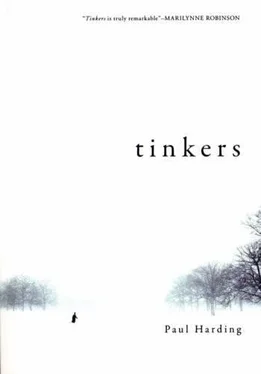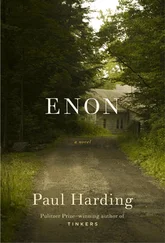How can I not wonder what it would be like to sit in that cold silver water, that cold stone water up to my chin, the tangled marsh grass at the level of my eyes, sit in the still water, in the still air, bright day behind me lighting the face of everything under the dark millstone cloud lid in front of me, watching the storm coming from the north? There is my father whispering in my ear, Be still, still, still. And yet you change everything. What was the marsh like, waiting for the storm before you came and kneeled in the water? It was like nothing. Watch after you leave the water, now cold and regretful, miles from home, certain of the belt on your backside, the cold shoulder, the extra chores; watch. Watch the water heal itself of your presence-not to repair injury but to offer itself again should you care to risk another strapping, because instead of the sky being dark and the trees and stones bright, the next time the sky will be bright but the world gloomy. Or there will be rain with no wind. Or wind and sun. Or a starry sky laced with clouds that look like cotton thread. You could not do better if you passed a thousand acts of Congress.
0, Senator, drop your trousers! Loosen your cravat! Eschew your spats and step into that shallow, teeming world of mayflies and dragonflies and frogs' eyes staring eye-to-eye with your own, and the silty bottom. Cease your filibuster against the world God gave you. Enough of your clamor, your embarrassing tendencies, your crooking of paths in the name of straightness. Enough of your calling ruin upon the Moor and the Hindoo, the Zulu and the Hun. None of it gains you a jot. Behold, and be a genius! At a breath, I shall disperse your world, your monuments of metal, your monuments of stone and your brightly striped rags. They will scatter like so many pins and skittles. I shall tire myself more quenching a candle in its sconce. Phew! There: you are gone.
I should say that the sermons my father gave on Sundays were bland and vague. Parishioners regularly drifted off to sleep sitting up in their pews and it was common to hear snoring coming from this or that corner of the room. My father's voice droned on about the importance of every little creature in the field, enumerating practically every crawling, swimming, flying beast he could and reiterating that it, too, was as important as any other of God's creations. And consider the rats in the grain, he would say. And the barking crows, and the squirrels collecting nuts. Are they, too, not God's creatures? And the foraging raccoon.
There was no correspondence between these inept speeches with the passionate, even obsessive writing he did up beneath the pitched roof. It seemed, in fact, that the more time my father spent in his study composing, the worse his sermons became, until they were practically no more than incoherent mumbling, in the midst of which, here and there, if one was actually listening, you could pick out the name of the odd prophet or the citation of a psalm or chapter or verse. The people of the town had little patience for mumbling, and what they at first must have taken as perhaps an especially indirect intelligence, one perhaps even given to constructing his sermons as parables in emulation of Christ, they soon got fed up with and began to complain about first in discreet letters, then directly to my father on the way out of church. My father responded to this criticism with genuine surprise, as if shocked that what must have really been on his mind had not been included in his sermon. My goodness, Mrs. Greenleaf, he would say, I am so sorry the sermon was not to your liking. The path is narrow. I must have wavered, he would say, and look confused. This was the first sign that he had in some way become unhitched from our world and was already beginning to drift away.
Finally, the situation became so alarming to the congregation (after a particularly baffling Sunday-morning service, during which my father at one point clearly mentioned something about the devil being finally not so bad after all) that the parishioners demanded a special meeting to address their new minister's deteriorating condition. On the Wednesday morning he was to meet with the deacons and the congregation, my mother practically had to dress him herself. He was pale and unshaven and seemed like a child. My mother saw him and cried, What are you doing? We have to go to the church for your meeting. Good Lord, good Lord. Throughout my father's deterioration, my mother had kept her thoughts to herself. She cooked and ironed and kept his house and must have trusted at first that my father was in some sort of a slump, that his weak sermons and increased time working on them must be part of a natural ebb and flow in any minister's career. Perhaps she even believed that he was going through a kind of healthy crisis of belief, one from which her husband would emerge with his faith refreshed and his convictions stronger than ever. Whatever she thought, she never spoke a word about it.
When my mother finally succeeded in getting my father shaved and into his clothes and off to the church, she ordered me to stay home from school and tend the house and be home when they returned. After they left, I sat at the kitchen table with my history book open to the chapter I was studying on Napoleon. There was a painting of him on a white horse and one of him leading a charge with his sword drawn and pointed toward an unseen enemy. I could not concentrate on the text. I worried about my father. Throughout his illness (that is the word that now, for the first time, came to my mind, and it shocked me and suddenly made me frightened), he had remained kind and remote toward me, as he had always been, but I had lately noticed him looking at me with a sort of wistfulness, as if he were not looking at me, but at a drawing or photograph of me, as if he were remembering me.
It seemed to me as if my father simply faded away. He became more and more difficult to see. One day, I thought he was sitting in his chair at his desk, writing. To all appearances, he scribbled at a sheet of paper. When I asked him where the bag for apple picking was, he disappeared. I could not tell whether he had been there in the first place or if I had asked my question to some lingering afterimage. He leaked out of the world gradually, though. At first, he seemed merely vague or peripheral. But then he could no longer furnish the proper frame for his clothes. He would ask me a question from behind the box on which I sat shelling peas or peeling potatoes for my mother, and when I answered and received no reply back, I would turn around, to find his hat or belt or a single shoe sitting in the door frame as if placed there by a mischievous child. The end came when we could no longer even see him, but felt him in brief disturbances of shadows or light, or as a slight pressure, as if the space one occupied suddenly had had something more packed into it, or we'd catch some faint scent out of season, such as the snow melting into the wool of his winter coat, but on a blistering August noon, as if the last few times I felt him as another being rather than as a recollection, he had thought to check up on this world at the wrong moment and accidentally stepped from whatever wintry place he was straight into the dog days. And it seems that doing so only confirmed to him his fate to fade away, his being in the wrong place, so that during these startled visits, although I could not see him, I could feel his surprise, his bafflement, the dismay felt in a dream when you suddenly meet the brother you forgot you had or remember the infant you left on the hillside miles away, hours ago, because somehow you were distracted and somehow you came to believe in a different life and your shock at these terrible recollections, these sudden reunions, comes as much from your sorrow at what you have neglected as it does from dismay at how thoroughly and quickly you came to believe in something else. And that other world that you first dreamed is always better if not real, because in it you have not jilted your lover, forsaken your child, turned your back on your brother. The world fell away from my father the way he fell away from us. We became his dream.
Читать дальше












